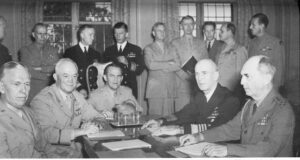The first Quebec Conference (code-named QUADRANT) which occurred August 14-24, 1943, was the third crucial Anglo-American conference in seven months. As at Casablanca in January and Washington in May (code-named TRIDENT), the chief difficulty was the strength of Allied commitment to the cross-Channel invasion and the consequent allocation of resources between the invasion of France and operations in the Mediterranean.
 A large support staff had already established themselves in the Château Frontenac by the time the Joint Chiefs of Staff (J.C.S.) arrived on August 13 to join the British chiefs. The next day Marshall cabled Secretary Stimson, who was still in Washington with the president: “From information following informal discussions last night and general discussion at meeting this morning it would appear that the differences are not to be insurmountable. However it is too early to hazard any definite opinion.”
A large support staff had already established themselves in the Château Frontenac by the time the Joint Chiefs of Staff (J.C.S.) arrived on August 13 to join the British chiefs. The next day Marshall cabled Secretary Stimson, who was still in Washington with the president: “From information following informal discussions last night and general discussion at meeting this morning it would appear that the differences are not to be insurmountable. However it is too early to hazard any definite opinion.”
Marshall’s caution was well founded, because the discussions soon became quite vigorous and sometimes acrimonious to the point where the Combined Chiefs of Staff (C.C.S.) met in closed sessions without the inhibiting presence of several score of subordinates. Marshall, the chief J.C.S. spokesman on European-Mediterranean issues, was determined to get a firm commitment from the British to launch the cross-Channel invasion. Marshall reminded the British that previous operations in the Mediterranean always seemed to absorb more shipping, troops, and materiel than had been anticipated, thereby undermining or precluding operations elsewhere. Consequently he insisted that henceforth whenever there was a shortage of resources OVERLORD would have an “overriding priority.” Without this, the notes of the August 15 meeting state, “in his opinion the operation was doomed and our whole strategic concept would have to be recast” and the number of U.S. forces in Britain sharply reduced.
When the Quebec meetings opened, the British military leaders asserted that they were indeed committed to OVERLORD, but that operation’s success was closely tied to the Allies’ capacity to reduce, through operations in north Italy, the number of German forces available to counter the invasion. Thus they did not wish to rule out more vigorous efforts in Italy. Following the August 15 C.C.S. meeting, Field Marshal Sir Alan Brooke—who had already that day received a “crushing blow” when Prime Minister Churchill told him that an American would command the invasion forces—noted in his diary that the Allies had “a most painful meeting and we settled nothing. I entirely failed to get Marshall to realise the relation between cross-Channel and Italian operations and the repercussions which the one exercises on the other. It is quite impossible to argue with him as he does not begin to understand a strategic problem.”
Some compromise was clearly essential; neither group of military leaders wished the president and the prime minister to feel compelled to settle the issues themselves. On August 17 the C.C.S. adopted and sent to Roosevelt and Churchill a document describing OVERLORD as “the primary U.S.-British ground and air effort against the Axis in Europe,” with a target date of May 1, 1944.
To learn more about Marshall’s role in the Quebec Conference please see volume 4 of The Papers of George Catlett Marshall.
